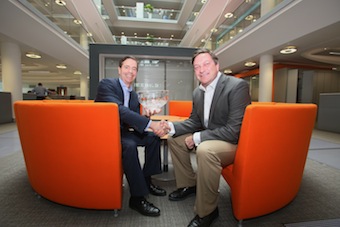Chess Telecom has acquired Scottish Microsoft Partner IRW Systems, a specialist in software design, development and support. IRW Systems brings significant capability and market share within the growing Chess IT and software consultancy space, providing 50 additional Software Design Specialists working in Glasgow and Edinburgh and adding £3m annual turnover to the Chess Group.
Chess Chief Executive, David Pollock, said: "IRW Systems has proven expertise within the Microsoft solutions portfolio, cloud applications and technical services arena.
"Together, we are positioned to deliver a range of consulting and software services to our existing and new customers and partners.
"This foundation is essential for enabling the next wave of technological change for customers focusing on the transition to cloud-based technologies and applications."
Ian Warnock, MD of IRW Systems, said: "Our complementary technologies and portfolios will enable our continued success in the cloud solutions arena."
Chess Director Richard Btesh added: "Our expanding presence from telecoms to the cloud, data and hosted space is bringing us more high profile acquisitions enquiries."
IRW Systems specialises in software and portal design, development and support services. Its solutions are built around the Microsoft platform and tools, particularly SharePoint, .Net, CRM, Mobile, Power BI, Web and Cloud based systems.
IRW Systems has built a blue chip customer base across the public and private sectors including central government departments, health, police, local authorities, communications, engineering/manufacturing, finance, professional services and the voluntary sector.
The firm employs over 50 employees across Glasgow and Edinburgh.

 Distributor ScanSource has enhanced its management structure for its Communications and POS and Barcode business units in Europe.
Distributor ScanSource has enhanced its management structure for its Communications and POS and Barcode business units in Europe. Hats off to eircom for scooping Xirrus' MSP Partner Of The Year Award for 2015.
Hats off to eircom for scooping Xirrus' MSP Partner Of The Year Award for 2015.